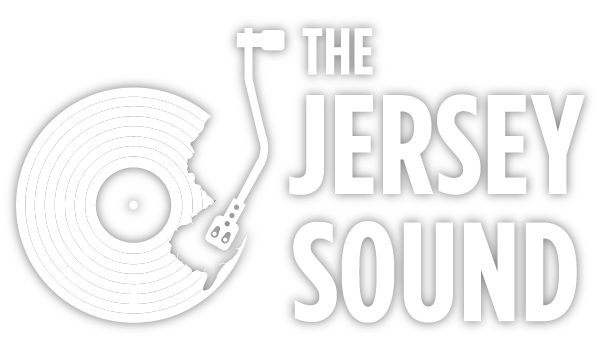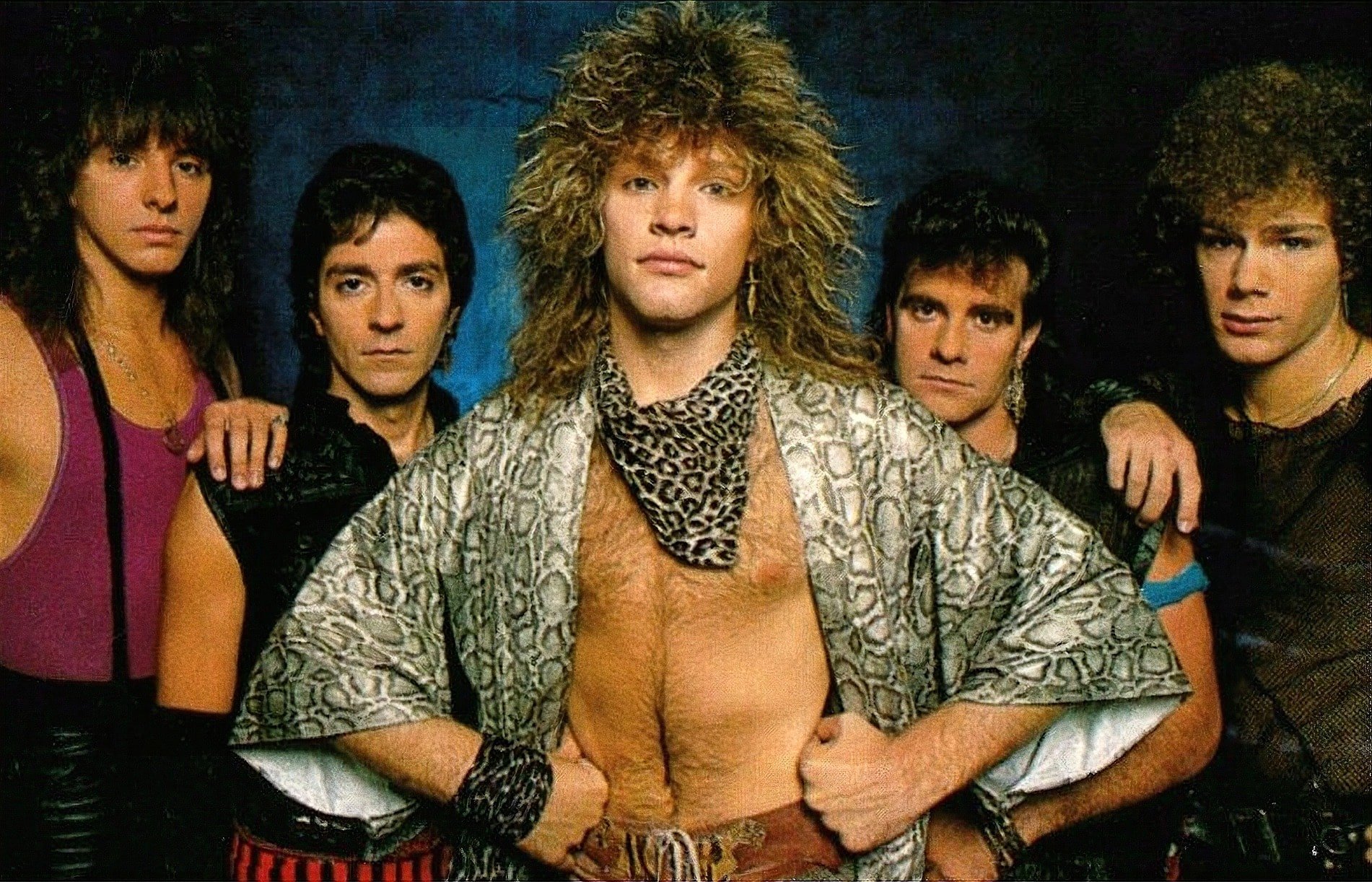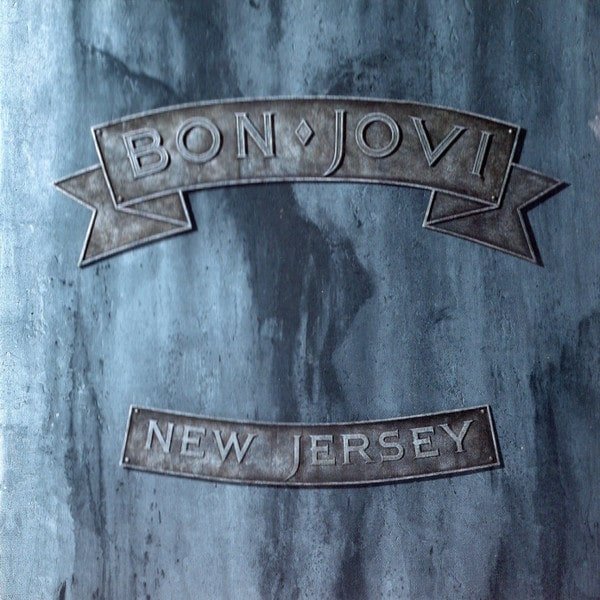Jon Bon Jovi
No one, not even Bruce, ever actually named one of his albums New Jersey. Back then, JonBon, as we used to call him at the Aquarian Weekly, wore his Jersey roots on his sleeve. Literally. And he used that Jersey patch as the cover of the album. Fans loved the album. Critics hated it. But no matter what side of the debate you were on, there was no doubting his sincerity, his roots-devotion, and his willingness to please. At least back then. When JonBon and I settled in for a feature one fateful day in 1989, he was expansive, articulate, humble, funny, profane, irreverent and friendly, the type of guy you’d want to hang out with. Here then, 34 years later, is an edited version of that talk in which his forceful personality still shines bright.
Bon Jovi, 1983 [Source: The Aquarian Weekly]
If Guns N’ Roses are the bad boys of rock’n’roll, Jon Bon Jovi is the good boy. He came out of Sayreville High School in New Jersey all skin and bones and hair. After seeing enough Southside Johnny & The Asbury Jukes concerts to know what he wanted to do with his life, he set about doing it, publicizing his cover band, The Atlantic City Expressway, himself, by calling my office at the Aquarian Weekly every week religiously to report where he’d be playing. He always asked, “could you please run a picture of us too…if there’s room?”
He was so polite.
Upon getting the chance to record one of his originals, “Runaway,” at a local studio, he made sure to enthuse his demo with true grit. The song opened some doors for him by appearing on a local compilation album of area talent. What he couldn’t know at the time was that radio in cities like Tampa, Denver, Detroit and Minneapolis were picking up on the track and playing it like crazy.
John—he had yet to delete the “h”—was playing in yet another of his unsuccessful barbands, Raze, when another opportunity presented itself. It was a small club tour organized by a local promoter who also had heard “Runaway.” He encouraged John to play the song on the tour as well as some of his other originals. John freaked. What singer/songwriter forced to play cover versions to survive financially wouldn’t jump at such a chance? John handpicked some cats he knew and the tour was on. What John couldn’t possibly have ever imagined at the time was how dead-on his musician picks were. Talk about picking the right guys! John and his friends—guitarist Richie Sambora, keyboardist David Bryan, drummer Tico Torres and bassist Alec John Such—would stay together for 11 years. The band would then continue without Such for another 15 years. They’ve never replaced him, using a series of hired guns ever since.
“I couldn’t make a dime playing original material. I remember playing The Fast Lane for $100-a-night. And we had to split it five ways! We were doing originals since ’79. In ’78, I was doing cover versions. Hell, I was 17.”
(Advertisement) Story continues below…
“I had bands that changed members so often, we kept changing the name of the band,” he remembers, “until I just used my name. We couldn’t make any money playing in Asbury Park or any of what was left of those clubs on the old circuit when the drinking age was 18. Remember when Phantom’s Opera and all those great cover bands were making a ton of money? They were huge! How were we going to compete with that? I couldn’t make a dime playing original material. I remember playing The Fast Lane for $100-a-night. And we had to split it five ways! We were doing originals since ’79. In ’78, I was doing cover versions. Hell, I was 17.
“People ask me all the time to describe the Jersey attitude and it’s really a hard thing to tell them,” he continues. “I try to explain it and wind up defending myself by telling them this: I’m not trying to say anything negative about where you’re from—whether it’s San Francisco, Los Angeles or wherever—but where I grew up, and at the time I grew up, to see a Lord Gunner on a Thursday night was magic. There was such a kick in the beer and a sweat in the soul of the music. There was no pretense. There was never a glam attitude or a big production attitude. It was just, `let’s grab these guitars and play, and if you want to jam, you better get up here and spit on the microphone with me.’
“So I never forgot that. I love that attitude. And that’s been the fire that’s fueled us and it’s worked. It’s so amazing to me that people can’t believe why I make everyone jam who comes to see us. Christ, that’s all we ever used to do in the bars, y’know? I never forgot Lance Larson saying to me at 16 years old, `come up here and play!’ It makes you feel like a million dollars. That’s the magic to me. I think the kids love it too. I know I sure love it. I mean, last week alone, I had Journey’s Steve Perry sing some Sam Cooke and you know the kids don’t have a fucking clue as to who Sam Cooke is. I had David Coverdale from Whitesnake. I had all the Guns N’Roses and Motley Crue guys. I had Sam Kinison sing `Wild Thing’ with Billy Idol, Steve Vai and Bruce Willis on harmonica backing him up. Then I brought out Little Richard for another encore we had a grand piano wheeled out for `Good Golly Miss Molly.’ God, I love that! That, to me, is what the New Jersey spirit is all about. That jam mentality. It’s the Jersey attitude, man, and I wear it proudly.”
So why don’t the critics get that? Bon Jovi has been trashed by national rock critics for years. Especially on the New Jersey album.
(Advertisement) Story continues below…
“Oh God yeah,” he agrees. “Believe me, we’ve taken much more than our fair share of grief over that album and even over the album cover and the album name. I never expected it. I guess I was stupid enough to think, that after selling 17 million records, people would judge us as us. I was going to call it Sons Of Beaches and I originally wanted the album cover to be like Strange Days by The Doors meets Sgt. Pepper’s Lonely Hearts Club Band. I wanted to put everyone on the beaches like the fat lady with the mustache and us incorporated in the beach scene too but you’d have to look real close to see where everyone was. I didn’t only because the guy I hired to do the album cover said it would take him six months to do it and I only had three weeks. So, in my typical album cover fashion, the patch I always wore on my jacket became the cover. Being who we were, with a name like what we have, people never knew if we were from Canada, France or Hollywood. Now they knew. Y’know, I’ve always had a bike and was basically a closet Hell’s Angel so I wore this patch that said `Bon Jovi New Jersey.’ First I said, `let’s put this on the inner sleeve,’ but when the Sons Of Beaches title fell through with that album cover idea, I started thinking of maybe parodying Slippery When Wet. I said, `naw, that’s no good. What do you think of just plain New Jersey?’ And nobody even flinched. Everybody went, `yeah, that’s not bad.’ So it’s simply who we are. This is what we do. It’s a plain album cover. Accept it for the music.
“Did I grow up in New Jersey? Would I have killed for a ticket to see the Jukes? Was I at Big Man’s West to see The Disciples Of Soul? Did I go to the Garden to see Bruce? Yes, yes, yes and yes! And I was influenced musically by all-of-the-above.”
(Advertisement) Story continues below…
“Well, then I got the fuckin’ backlash because of Bruce! And I went, `man, you never called me a Bruce clone before and all of a sudden I call an album New Jersey and people jump down my shit? I mean, sure, Bruce is definitely associated strongly with the state. Very strongly. And I have to accept that for what it’s worth. But we went down for it. We got beat up so bad for it when the album came out. Now, though, by touring and touring and two #1 singles off the album, it’s standing on its own. We’re as influenced by Bruce as we are by Southside Johnny & The Asbury Jukes and particularly Miami Steve [Van Zandt]. It’s just people all over know Bruce and they don’t necessarily know Southside or Steve. Did I grow up in New Jersey? Would I have killed for a ticket to see the Jukes? Was I at Big Man’s West to see The Disciples Of Soul? Did I go to the Garden to see Bruce? Yes, yes, yes and yes! And I was influenced musically by all-of-the-above.”
Back at Sayreville High School, John Bongiovi wasn’t too popular. A bit of a loner, he had a small clique of kids he hung out with, who all wore purple satin jackets to school every day like he did in honor of The Asbury Jukes. But Jon’s said Atlantic City Expressway on it. “We thought we were The Jukes, y’know? Here was this little pint-sized Juke walking around! That’s what we did. It was funny. It was a compliment but it was a joke at the same time.
“David was still in school,” Jon says of the formation of the band. “Tico was in another band called Franke & The Knockouts who had just got off the road opening for Toto. Alec and Richie had their own band with an independent release and had been opening for Joe Cocker. They had a couple of weeks off so I said, `hey, you want to do these couple of shows with me?’ It was to promote this WAPP Homegrown album I had one cut on. We played The Fountain Casino with three other bands from the album. And that was it. We weren’t supposed to stay together but by that time the record started exploding nationally and there was a record deal pending. And I liked the guys and they liked me—we just got along.”
When I thank him for the interview, he says, “no sweat, man. Come see us when we come home. Us Jersey boys got to stick together. We’ll split a shot and a beer.”
Originally published in The Aquarian Weekly. Used by Permission.


